Search
Did you mean: Midas?
Summary 
Loading AI-generated summary based on World History Encyclopedia articles ...
Search Results
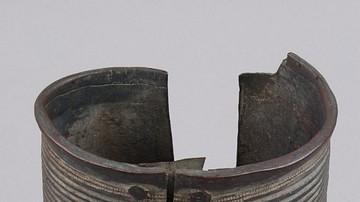
Image
Metal Armlet, Hausaland
A metal armlet or anklet from Hausaland, northern Nigeria. Hausaland was composed of a group of city-states which flourished from the 15th to 18th century CE. Length: 16 cm. (British Museum, London)
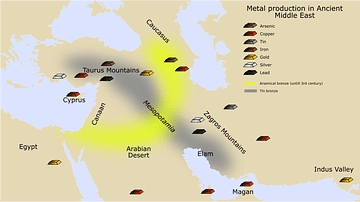
Image
Ancient Near Eastern Metal Production
A map showing the major sites of metal production in the Ancient Near East, including Egypt, Asia Minor, Mesopotamia, Persia, and the Indus Valley Civilization.

Video
Beyond El Dorado: From wax to metal: goldmaking techniques of the ancient Colombians
From wax to metal (de la cera al metal) Goldmaking techniques of the ancient Colombians Created for the exhibition Beyond El Dorado: power and gold in ancient Colombia at the British Museum, Organised with Museo del Oro, 17 October 2013...

Video
From wax to metal: goldmaking techniques of the ancient Colombians
From wax to metal (de la cera al metal) Goldmaking techniques of the ancient Colombians Created for the exhibition Beyond El Dorado: power and gold in ancient Colombia at the British Museum, Organised with Museo del Oro, 17 October 2013...

Video
Full Metal Jousting - The Rules of the Joust | History
Shane explains the point system and the essential do's and don't's of jousting. HISTORY®, now reaching more than 98 million homes, is the leading destination for award-winning original series and specials that connect viewers with history...

Definition
Steam Hammer
The steam hammer was developed in 1839 by the Scotsman James Nasmyth (also spelt Naysmyth, 1808-1890). Coming in a wide range of dimensions, the steam-powered machine was used to forge and shape very large pieces of metal for industrial use...

Article
The Armour of an English Medieval Knight
English medieval knights wore metal armour of iron or steel to protect themselves from archers and the long swords of opponents. From the 9th century CE, chain mail suits gave protection and freedom of movement until solid plate armour became...
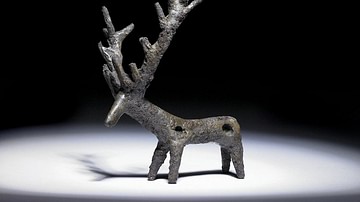
Definition
Copper in Antiquity
Copper was probably the first metal used by ancient cultures, and the oldest artefacts made with it date to the Neolithic period. The shiny red-brown metal was used for jewellery, tools, sculpture, bells, vessels, lamps, amulets, and death...
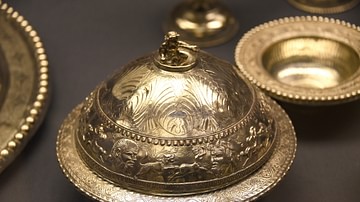
Definition
Silver in Antiquity
Silver had great value and aesthetic appeal in many ancient cultures where it was used to make jewellery, tableware, figurines, ritual objects and rough-cut pieces known as hacksilver which could be used in trade or to store wealth. The metal...
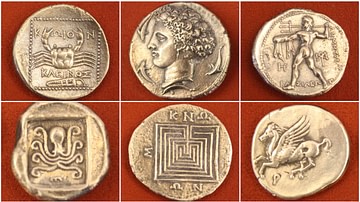
Definition
Ancient Greek Coinage
The coinage of ancient Greece has given us some of the most recognisable images from antiquity as they were stamped with designs to proudly declare the identity of the city which minted them and guarantee their value. One of the great archaeological...